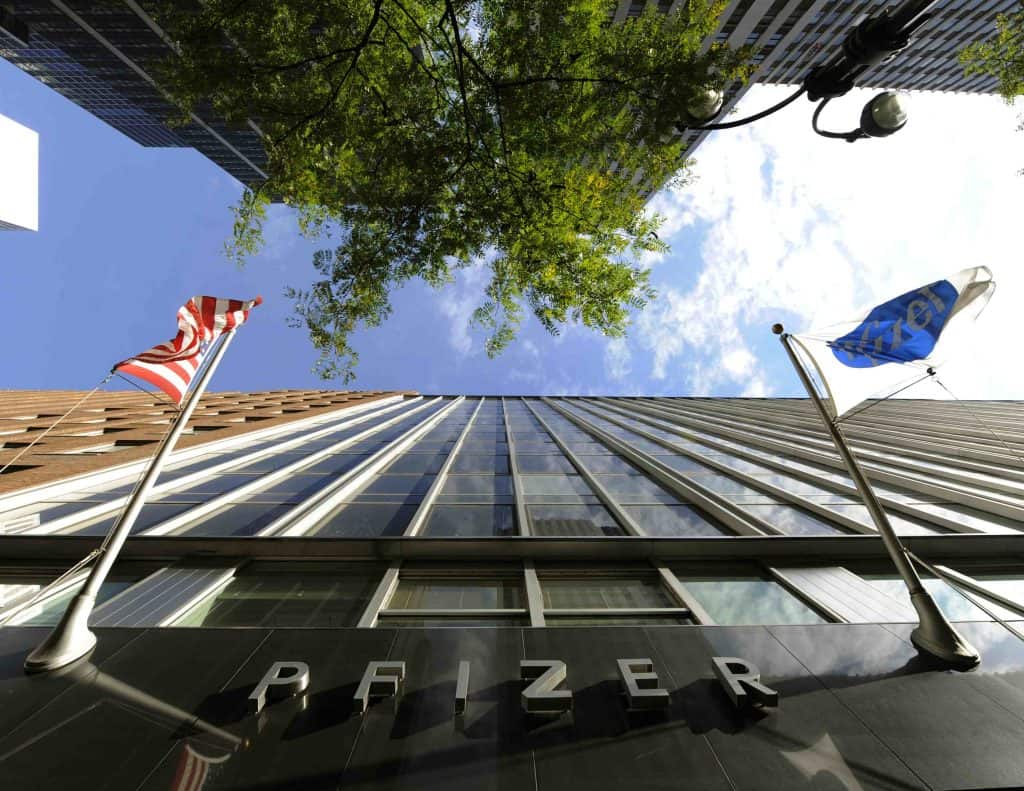
Pfizer signs $3 billion cancer deal
pharmafile | November 18, 2014 | News story | Research and Development, Sales and Marketing | Cancer, Merck KGaA, PD-L1, Pfizer, anti-PD-L1, opdivo
Pfizer has signed a multi-billion dollar deal to develop one of Merck KGaA’s investigational drugs, MSB0010718C, an anti-PD-L1 antibody.
The agreement could be worth nearly $3 billion to the German firm: $850 million up front from Pfizer and potential regulatory and commercial milestone payments totalling another $2 billion.
The US firm wants the deal to be a catalyst to rapidly expand its oncology business, while Merck will now get access to the US market.
The companies hope the product will be a treatment for multiple types of cancer and will jointly fund all development and commercialisation costs and share equally all revenues.
Anti-PD-1 antibodies are a new type of cancer treatment on which many researchers are pinning their hopes – with Roche, AstraZeneca and Bristol-Myers Squibb all developing candidates for a market potentially worth up to $35 billion per year.
The world’s first licence was given earlier this year to Ono Pharmaceutical’s Opdivo (nivolumab) for adults with unresectable melanoma.
There had been questions over Merck’s product, with EP Vantage suggesting that MSB0010718C “was seen as a serious laggard in the immuno-oncology race, but with today’s $850m endorsement from none other than Pfizer the doubts have been swept away”.
EP Vantage goes on: “Still, Pfizer itself risked becoming an also-ran in this fast-moving space, so it clearly needed to do something fast. The Merck deal was apparently plan B after the bid for AstraZeneca.”
AZ rebuffed Pfizer’s $118 billion offer for the firm in May – and although Pfizer could make another bid for the Anglo-Swedish drugmaker after 26 November, the market feels it is ‘unlikely’ that “Pfizer will reopen that can of worms”, the note concludes.
Albert Bourla, Pfizer group president vaccines, oncology and consumer healthcare businesses, insists: “Immuno-oncology is a top priority for Pfizer.”
There is an ongoing Phase I programme for MSB0010718C which has treated more than 550 patients, interim data for which demonstrated a complete response and partial responses in patients with non-small cell lung cancer and ovarian cancer.
Pfizer and Merck have in mind ‘up to 20’ clinical development programmes, including half a dozen Phase II or III registration trials which are expected to start next year, using the drug as a single agent and in combination with products from their existing oncology portfolios.
More results from the Phase I trial are expected to be presented at medical congresses in 2015. Meanwhile, an ongoing Phase II study is looking at the antibody in patients with metastatic Merkel cell carcinoma, a rare form of skin cancer.
“Early results for Merck KGaA’s PD-L1 in patient trials are impressive and consistent with the results seen with the class of PD-1 and PD-L1 antibodies,” explains Mikael Dolsten, president of Pfizer Worldwide Research and Development (WRD). “This promising foundation of research will form the basis of multiple registration trials.”
“This alliance enables us to significantly accelerate the timeframe of our development programmes and move into the first wave of potential immuno-oncology based treatment regimens,” adds Bourla.
“Collaborating globally with Pfizer will allow us to benefit from the strengths and capabilities of both companies in immuno-oncology, further accelerating this promising asset in the race to address the needs of cancer patients across multiple tumour types,” says Belén Garijo, president and chief executive of Merck’s biopharmaceutical division Merck Serono.
Away from the PD-L1 programmes, Pfizer and Merck have also agreed to co-promote Pfizer’s kinase inhibitor Xalkori (crizotinib), which is indicated in the US for the treatment of patients with metastatic non-small cell lung cancer (NSCLC).
Adam Hill
Related Content

Central nervous system cancer metastases – the evolution of diagnostics and treatment
The current forms of immunotherapy, how T cell therapy works and what the future holds

BioMed X and Servier launch Europe’s first XSeed Labs to advance AI-powered antibody design
BioMed X and Servier have announced the launch of Europe’s first XSeed Labs research project, …

T-cell therapy – the evolution of cancer treatments
The current forms of immunotherapy, how T cell therapy works and what the future holds






